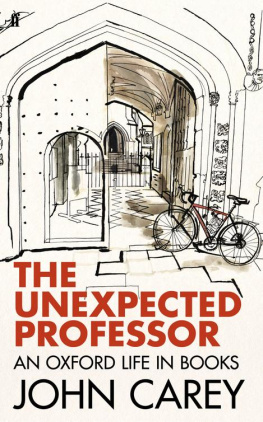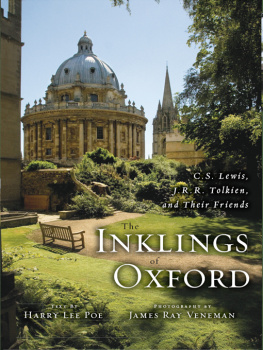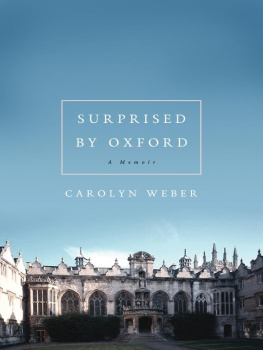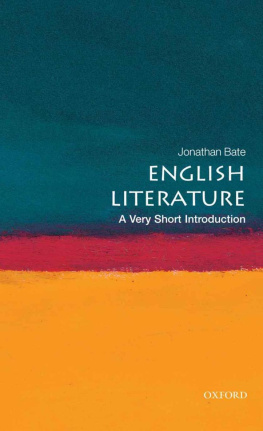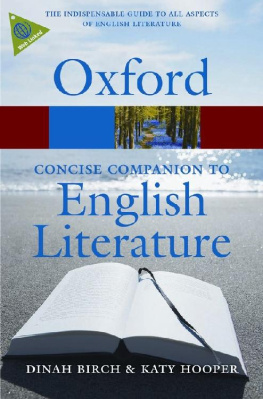This book started life when a friend suggested I might write a history of English literature. It seemed an attractive idea at first, but I soon realised that it would mean a lot of donkey work, and that most of the facts would already be available on the internet. So Ive written something more personal a history of English literature and me, how we met, how we got on, what came of it.
You could read it as a short introduction to English literature admittedly a selective and opinionated one. Or you could read it as a case study, showing how one kind of upbringing produces a preference for some books rather than others.
A lot of it is about Oxford, where I have spent my working life. Oxford has obviously changed greatly since I arrived there in the 1950s, and in many respects for the better. But I think even those who know the place well may be surprised to learn just how extreme the change has been.
One thing that has not changed is that Oxford and Cambridge still take vastly disproportionate numbers of public-school students. This is often blamed on Oxford and Cambridge. The blame, however, lies with those who destroyed the grammar schools. Selecting for merit, not money, the grammar schools, had they survived, would by now have all but eliminated the public-school contingent in Oxford and Cambridge, with far-reaching effects on our society. This book is, among other things, my tribute of gratitude to a grammar school.
Because my main subject is books, people get into the story only incidentally, and many friends and ex-students, who might reasonably expect to be mentioned, are not and may feel slighted. On the other hand, they may feel relieved to be left out. Either way, Id like to thank them for the discussions about books weve had over the years.
There cant really have been an elephant. But an elephant is what I remember. I was in a pushchair, and all around me were excited people shouting and waving flags. Away to the right I could see, coming up the road towards us, a kind of carnival procession, music and colours and an elephant leading the way. I now realise that these celebrations must have been for the Silver Jubilee of King George V on 6 May 1935, which means I was thirteen months old. The road, Im pretty sure, was Castelnau, Barnes, a broad thoroughfare that crosses the top of Lonsdale Road, where we lived. As for the elephant, I suppose he must have strayed into my memory from some circus poster seen later in my childhood, and my brain, trying to make sense of things as the brain does, glued him onto that early scene of joy.
We were not a family much given to celebration, and I imagine we walked straight home once the procession had passed. Barnes is tucked into a loop of the Thames southwest of London, and Lonsdale Road runs beside the river. Our house looked out over broad, glinting sheets of water reservoirs, belonging to the Metropolitan Water Board, surrounded by grassy banks. Beyond were trees, then the river, then, far in the distance, the tower of Chiswick church, sometimes with a flag on top.
One night my father carried me to an upstairs window to see a glare in the sky. It was, I was told later, the Crystal Palace burning down, which happened on 30 November 1936, so I must have been two and a half. It had originally been built in Hyde Park to house the 1851 Great Exhibition, and was relocated in Sydenham, where it became a popular resort for young office workers and their girlfriends, always packed with pleasure seekers on bank holidays. A hundred thousand people assembled to watch it burn, among them Winston Churchill, who said, This is the end of an age. I suppose my father must have been feeling something like that too.
Apart from this chance glimpse of the outside world, my knowledge of my surroundings was confined to shopping expeditions with my mother, but these had their own excitements . At the top of the road, on a corner opposite where we had watched the Jubilee procession, was a branch of the United Dairies. A bell tinkled as you entered, and inside was a temple of immaculate whiteness, white marble counters, white-tiled walls, and the ladies who presided were all in white too including their gloves and hats. I was captivated by their dexterity. If my mother ordered a pound of butter one of the ladies would take up a pair of wooden butter pats, slice a wedge from a gleaming mound on the counter, beat it into a precise rectangular shape, drop it neatly onto a square of greaseproof paper on the scales, wrap it with a couple of deft flutters of the white gloves, and hand the completed artefact to my mother as if it was nothing remarkable.
Turning right out of the United Dairies we would approach Hammersmith Bridge, a magnificent Victorian iron structure, slung between imposing stone towers, which was one of the wonders of my childhood. It was a family legend that the dastardly IRA had once tried to blow it up but a brave policeman had foiled them by flinging the bomb into the river just in time. This was almost true, and happened in 1939. The rescuer, though, was not a policeman but a hairdresser from Chiswick called Maurice Childs, who spotted a suspiciously smouldering suitcase on his walk home and tipped it over the railings. The explosion sent up a jet of water sixty feet high.
For me the great pleasure of the bridge was that it shook when double-decker buses went across. My parents explained that it was a suspension bridge, and shaking made it safer. But it did not feel safe, it felt exhilarating. There I would be, far above the water, clutching my mothers hand, and the pavement would begin to spring up and down like a diving board. The bridges other thrill was the seagulls. At Barnes the Thames is still tidal. On a good day you can smell the sea. At low tide gulls would crowd the mud flats and if you took a bag of crusts and tossed a few over the railings you would be surrounded by a swooping, screaming tornado of beaks and feathers.
Once across the bridge my mother and I were in Hammersmith , a quiet place in those days with no flyover and no motorway, and we would walk up towards Hammersmith Broadway and Palmers Stores, a grand emporium with, as old photographs show, an ornate four-storey Alhambra-style brick facade and sparkling white blinds at street level to protect shoppers from the weather. Palmers Stores was so big that you could walk through it from Hammersmith Bridge Road and come out on King Street the other side, but the only bit I remember was the fish department, which was the first you came to. The floor was covered in sawdust and the men in charge wore coarse blue aprons that shielded them from neck to ankles. Shoals of dead fish gaped on sloping stone slabs, and there were two-handled baskets of shellfish. I know almost nothing about my mothers likes and dislikes. She was too unselfish to consider them of any importance. But it was a family joke, perhaps a remnant from some seaside holiday before I was born, that she was fond of oysters and also winkles (which were considered lower-class and therefore comic). I wish I could remember her buying some in Palmers Stores but I dont think she ever did.
That was virtually the whole extent of my world up to the age of about five. There were six of us in the family, my father and mother, a brother, Bill, and two sisters, Marjorie and Rosemary. Bill, born in 1921, was thirteen years older than me; Marjorie, born three years later, was ten years older. So they belonged to another generation and seemed remote and adult to me as a child. Rosemary was only two years older than me but, being a girl, seemed rather remote too. As for my parents, it never occurred to me that they had ever been young. I knew almost nothing of their early lives. The past was never talked about. What I have been able to piece together was mostly discovered long after they were both dead.

